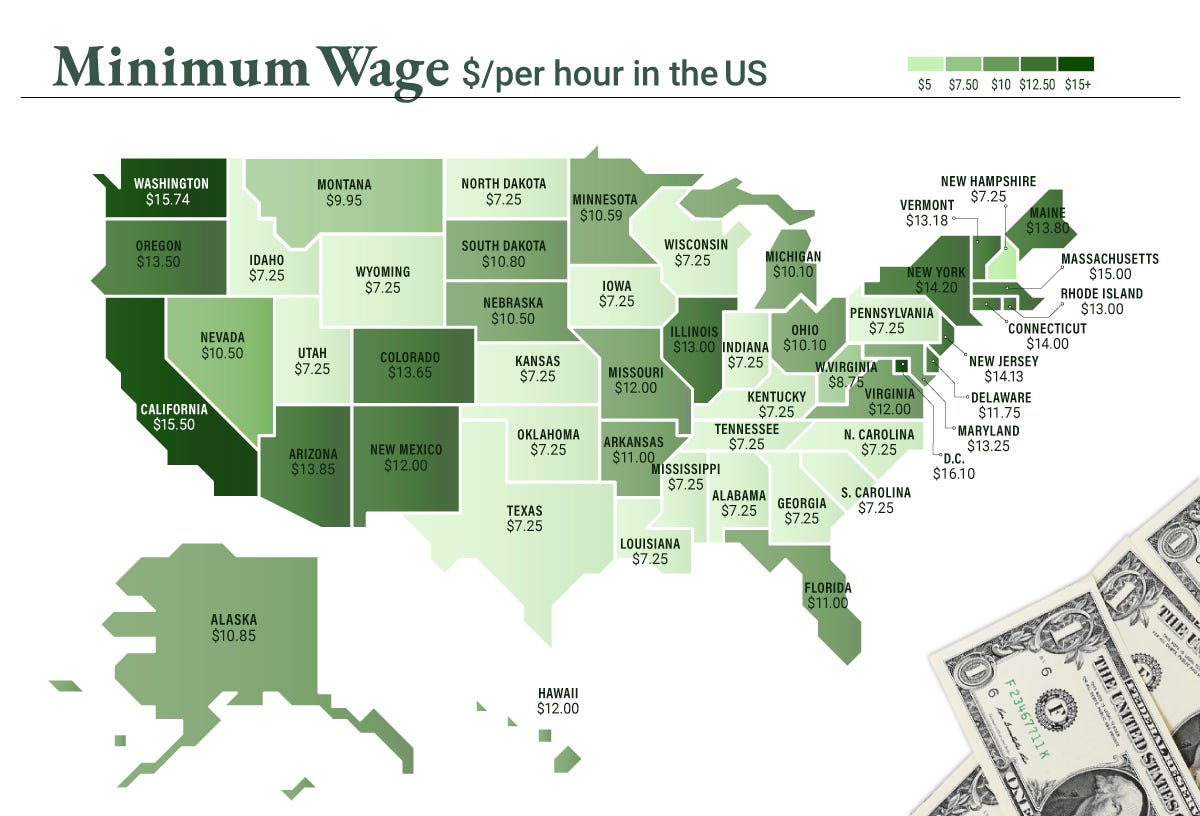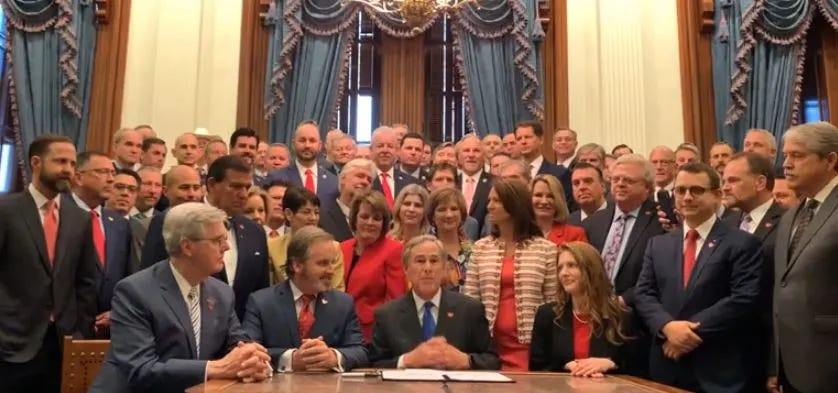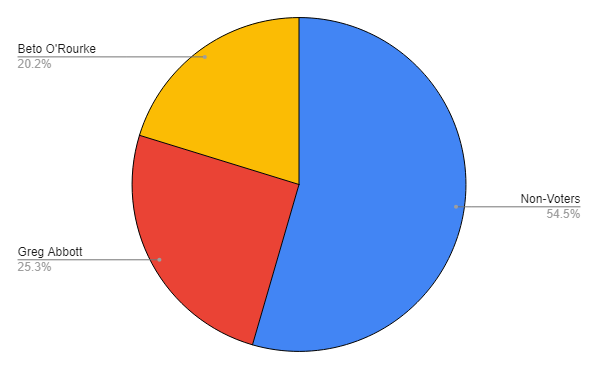How Republican Policies Have Led To High Poverty Rates In Texas
Republican legislators in Texas consistently throw up roadblocks to Democratic solutions for poverty issues and deepen hardships for Texans.
Texas isn’t a red state. It’s a non-voting state. We can talk about why that is or who is at fault, but more importantly, we need to talk about the consequences of it. Earlier this week, the Texas Tribune published an article titled. “Food banks are under pressure from Texas’ high level of food insecurity.”
I shared that article on Twitter, and what surprised me was how many people responded that they didn’t believe there were high rates of food insecurity in Texas or that so many people in Texas are below the poverty line.
Here is the information (hyperlinks lead to sources):
According to the US Census, the poverty rate is 14% in Texas, which is almost three points higher than the national average.
According to Feeding Texas, 4 million Texans regularly struggle with food insecurity.
Also, according to Feeding Texas, 20% of Texas children experience hunger.
This is a severe issue impacting millions of people, millions of children. Over the last few decades, Democrats in Austin have been offering solutions every legislative session to reduce poverty and feed children, but in every session, Republicans block it.
Increasing the minimum wage.
The minimum wage in Texas is still $7.25 per hour. It hasn’t been raised in 13 years. In fact, Texas is only one of the handful of states that still has their minimum wage so low.
Increasing the minimum wage can be an effective strategy for reducing poverty. A 2021 report by the Brookings Institute found that a $15 minimum wage would help millions of struggling households achieve self-sufficiency. That would be a big deal in Texas, considering 40% of our population earns less than $15.
During the last legislative session, Sarah Eckhardt (D), Trey Martinez-Fisher (D), Vikki Goodwin (D), and Armando Walle (D) each filed bills to raise the minimum wage in Texas. Plus, other Democrats filed bills to raise the minimum wage for servers (still $2.13) and bus drivers.
And despite the right-wing talking points, raising the minimum wage WILL NOT cause massive inflation or increase prices. Just listen to what the experts have to say.
According to the Economic Policy Institute, minimum wage increases have a negligible effect on inflation. For example, a 10% increase in the minimum wage might only increase food prices by 0.36%. This would have a marginal impact on prices and inflation.
Affordable Housing Initiatives.
A 2023 report by the National Low Income Housing Coalition (NLIHC) ranked Texas as the sixth-worst state in the US for affordable housing for extremely low-income renters. Austin, Dallas, and Houston rank third, fourth, and fifth for worst metropolitan areas in the country. It also found that 22% of all Texas rental households are extremely low income, and 79% are severely cost-burdened (spend over half their income on housing).
This year in the 88th Legislature, dozens of Democrats filed bills that would have increased affordable housing in Texas, and almost all of them were killed by Republicans in the Senate.
However, Republicans did give tax credits to homebuilders and tried to pass a bill that would have relaxed building regulations, which Democrats ultimately killed.
Habitat for Humanity suggests creating new resources to support homes for those with the lowest incomes and expanding the availability of housing vouchers to make more existing homes affordable. The Bipartisan Policy Center also published a list of ten ways cities can improve housing affordability. Some suggestions include improving zoning laws and increasing housing voucher programs.
For several sessions, Democrats in Texas have filed bills to impact the housing crisis directly, only to be shut down by Republicans.
Expanding Healthcare Access.
A study published by the Episcopal Health Foundation found that Texas would save money in the state budget by implementing Medicaid expansion. Other states reduced spending in particular areas — such as mental health and corrections — using federal Medicaid expansion dollars.
The ACA also reduced income inequality. The decrease was much more significant in states that expanded Medicaid than in states that did not. Protecting people from the financial consequences of paying for health services reduces the risk of being pushed into poverty.
According to a study by Health Affairs, Medicaid continues to be one of the most significant components of the safety net for low-income households in the United States.
Since the inception of the ACA under President Obama, Democrats have filed bills to expand Medicaid in each legislative session. And in each session, Republicans blocked them from moving forward.
Childcare Assistance.
According to Children at Risk, most Texas families can’t afford child care. The median household income in Texas is $57,000 annually, which is less than the federal recommendation of $140,000 per year for a family with one infant.
Strong Nation’s recent study and report estimated that Texas loses $11.4 billion yearly due to childcare challenges that cause parents to miss, quit, or scale back on work.
Childcare costs burden Texas parents, and our state has a childcare crisis.
In the last legislative session, Julie Johnson (D) filed a bill to address this issue by establishing a voluntary partnership program between the State of Texas and private employers under which the state will match employer contributions to their employees’ childcare costs. Republicans killed it.
James Talarico (D) introduced a bill for Universal pre-k in Texas. Republicans killed it.
Diago Bernal (D) introduced a bill for grant programs to help low-income families with the cost of childcare. Republicans killed it.
There were dozens of other bills filed by Democrats to cut childcare costs, each blocked by Republicans.
Food Security Programs.
Over 4 million Texans experience food insecurity or difficulty meeting basic food needs. While we have the SNAP program and free and reduced meals for specific students, there is so much more our Legislature could and should be doing to ensure the most vulnerable people in Texas aren’t starving.
Yet, impoverished Texans, the vast majority of them children, could go hungry this Christmas because of dysfunction at the Texas Health and Human Services Commission, whistleblowers at the state agency warned in an anonymous letter released Nov. 21.
According to the Austin Chronicle, the Texas Democratic delegation to Congress has been aware of the HHSC meltdown since July and has been working to get the federal government involved. US Rep. Lloyd Doggett, D-Austin, has met regularly with officials from the Department of Agriculture, which has authority over SNAP, and the agency has met with HHSC officials and warned them that they are breaking state law.
What have Republicans done? Nothing.
Criminal Justice Reform.
There are a ton of criminal justice reforms that would reduce poverty in Texas. That includes reforms that reduce or eliminate cash bail requirements, which would prevent the pretrial detention of low-income individuals who can’t afford bail. This prevents job loss and disruption to families, reducing the likelihood of falling into poverty due to short-term incarceration.
In the 88th Legislative session, instead of eliminating cash bail, Republicans passed a bill to deny any bail to offenders of certain crimes.
Texas needs reforms that address racial disparities within the criminal justice system. This would also have a significant impact on poverty reduction, as communities of color are disproportionately affected by the criminal justice system. Fair treatment in the justice system can prevent poverty among marginalized groups.
However, Democrats have struggled to get bills through which address racial disparities because the Republicans in our government look like this:
Aside from the fact that the majority of the Republican Party believes and upholds white supremacist ideals, many of them are making cash hand-over-fist from donations from the private prison industry.
Transportation Accessibility.
How many years have we heard about bullet trains connecting major metro areas in Texas? Throughout multiple legislative sessions, some Republican lawmakers sought to limit how the project could be developed or financed. Others tried to kill it outright. While high-speed trains would be good for Texas, the environment, and the economy, Republicans have bent over backward to kill them.
Aside from the bullet trains, improving public transportation networks in Texas can significantly benefit low-income individuals by providing them with affordable and efficient commuting options. The state should allocate more funds to support public transportation infrastructure, maintenance, and service expansion, particularly in underserved areas and low-income communities.
None of that has happened, though.
Support for the Houseless Population.
Texas has the 5th highest houseless population in the nation. We already discussed affordable housing, but increasing the availability of affordable housing units through subsidies, low-income housing tax credits, and partnerships with developers can create more affordable housing options for low-income individuals and families.
Wraparound services like mental health counseling, substance abuse treatment, job training, and case management can all address the underlying issues that contribute to homelessness and help individuals maintain housing stability.
Unfortunately, Texas is the worst-ranking state for mental healthcare services. However, instead of investing in mental health services, Republicans criminalized houselessness. In 2021, Texas became the first state to reinstate vagrancy laws.
To reduce poverty in Texas, we have to vote out Republicans.
Despite the multifaceted efforts put forth by Democratic legislators aimed at addressing poverty-related challenges in Texas, the significant roadblock is opposition and obstruction from the Republican-controlled Legislature. Over the years, a range of progressive proposals seeking to uplift the socio-economic conditions of Texans has faced relentless resistance from the right.
The refusal to increase the minimum wage, enhance affordable housing initiatives, expand healthcare access through Medicaid, and alleviate childcare costs speaks volumes about the priorities of the state’s Republican leadership. These policy decisions, coupled with a lack of substantial investments in transportation accessibility and support for the houseless population, have perpetuated an environment that fails to support the most vulnerable in our society adequately.
The persistent rejection of bills designed to uplift Texans underlines a pattern of neglect that has contributed to the worsening of poverty rates in the state.
I’ve said it before, and I’ll repeat it. Texans do not have to live under this regime. We have the numbers to vote them out. All we have to do is show up.
The impediment to progressive policies by Republican legislators is not merely a partisan standoff but a tangible barrier to alleviating poverty and fostering equitable opportunities for all Texans.
If we want to dismantle systemic barriers, promote inclusivity, and enable a more prosperous future for all residents of the Lone Star State, our only option is to vote against Republicans up and down the ballot.
LoneStarLeft’s Newsletter is a reader-supported publication. To receive new posts and support my work, consider becoming a free or paid subscriber.








We're a business friendly, not worker friendly state. This poverty affects rural Texas more than urban Texas I feel. I think we need to be blunt and call ourselves poor, but politicians hide that poverty through slogans of country pride, etc. Most Texas associations lookout for the businesses interests, not worker interests (TX restaurant association, homebuilders associations, etc.). Luckily there's been increased unionization and group voicing, but more is needed.
Tarrant County will raise about $350,000 if past years are an indication....with that they do what?
fund the office and the phones? to what purpose. no one outside of the Party Leadership knows there is a TCDP.
We will know in a few weeks at least if Crystal Gayeden attracted a few more candidates...and no not hunt or read...already running....but SR and SS candidates and JP's and constables. If not she should not run in 2024. Contrary to what she has said she will know how well she did in candidate recruitment well before the deadline.
The State? i will leave that to bigger minds other than to say they have been total failures going all the way back to 1996.